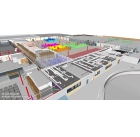ISG helps Asda move to Level 2 BIM

ISG is to deliver Asda’s first Level 2 BIM (Building Information Modelling) project after securing a £10 million new-build project in Clacton-on-Sea. The contractor was appointed to Asda’s global BIM steering group in 2014. Following trial BIM projects at the company’s new Barry store in south Wales and the Beeston store in Leeds, Asda has awarded its first full Level 2 project to ISG.
The build programme for this 3250 m2 store has been fully designed in BIM, with all consultants working in collaboration software system Autodesk Revit, resulting in the production of seven fully annotated 3D models.
ISG is acting as Asda’s information manager, collating all digital information and co-ordinating clash detection with the project consultants.
The BIM process enables ISG to co-ordinate all asset information to enable a fully digitised handover that will integrate seamlessly with Asda’s facilities-management systems.
Rob Martin, ISG’s Western regional managing director, commented, ‘This project represents the culmination of a journey by Asda into advanced collaborative working practices, where ISG has played a key role as a trusted project partner and influencer.
‘In a sector where operational costs and asset management are critical, BIM not only creates efficiency benefits during the build phase but also throughout the service life of the store, and we are thrilled to be working with Asda on such a milestone project.’







